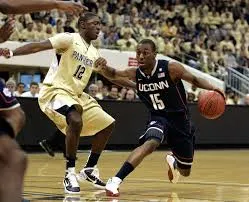Table of Contents
Introduction
When you think about college basketball legends, Walker’s name at UConn immediately comes to mind. His time at the University of Connecticut wasn’t just memorable; it was downright iconic. Walker led his team to national championships, broke records, and delivered performances that left fans and analysts alike in awe. He was the heart and soul of UConn during his college years, and his impact on the game is still talked about today.
But despite all the accolades and the spotlight that followed him through his college career, there’s a big question mark hanging over his head: Will Walker ever make it into the Basketball Hall of Fame? This question might surprise some fans who remember his college days as some of the best in recent history. The Hall of Fame is the ultimate recognition for any player, and getting there isn’t as straightforward as it might seem.
In this article, we’re diving deep into Walker’s UConn career to highlight just how groundbreaking it was. We’ll also explore why, despite his stellar college achievements, his path to the Hall of Fame remains uncertain.
Whether you’re a die-hard fan of Walker, a UConn alum, or just a basketball enthusiast, understanding this debate offers fascinating insights into what it takes to be enshrined in the Hall of Fame. So, let’s unpack the legend of Walker and the hurdles he might face on the road to basketball immortality.

Walker’s UConn Legacy
When we talk about college basketball icons, Walker’s name at UConn shines brightly. His career with the Huskies was nothing short of legendary. Let’s take a closer look at what made his time at UConn so special and why his legacy still resonates in the world of college basketball.
Historic Achievements
Walker wasn’t just a player; he was a game-changer for UConn. His role in leading the Huskies to national championships was pivotal. Think about it: winning a national title is the pinnacle of college basketball, and Walker was at the forefront of that success. His leadership on the court was instrumental in securing those championships, and his influence helped cement UConn’s reputation as a powerhouse in college basketball.
But Walker didn’t just win titles; he also set records that still stand out. From career high scores to game-changing plays, Walker’s name is etched into the UConn record books. These records aren’t just numbers; they represent his exceptional talent and the unforgettable moments he created on the court.
Individual Honors
Awards and accolades are the gold stars of a player’s career, and Walker earned plenty of them. He was named Player of the Year and received multiple All-American selections. These honors are a testament to his skill, dedication, and the high regard in which he was held by his peers and coaches. Each award highlights a different aspect of his game, from his scoring ability to his overall impact on the team.
Statistically, Walker’s contributions were significant. His numbers tell the story of a player who dominated in various aspects of the game. Whether it was points scored, assists, or rebounds, Walker’s stats reflect a career of excellence and consistency.
Memorable Moments
Walker’s time at UConn was filled with unforgettable moments. Think of the key games where he delivered clutch performances and led his team to victory in high-stakes situations. These games aren’t just part of the record books; they’re etched in the memories of fans and analysts who witnessed his brilliance firsthand.
And then there are the impactful plays that became the stuff of legend. Whether it was a game-winning shot, a spectacular dunk, or a critical defensive play, Walker’s ability to deliver in crucial moments is what made him stand out. These moments are a big part of why he’s remembered so fondly and why his career at UConn is considered iconic.
Walker’s legacy at UConn isn’t just about the titles and the stats; it’s about the unforgettable impact he had on the game. His career remains a shining example of what makes college basketball so exciting and why his time with the Huskies will always be remembered as a golden era in the sport.
Evaluating Hall of Fame Criteria
When it comes to being inducted into the Basketball Hall of Fame, it’s not just about having a standout college career—there’s a lot more to it. The Hall of Fame is like the ultimate club for basketball greatness, and the criteria for getting in are pretty strict. Let’s break down what it takes to make it into this prestigious group and how Walker’s career stacks up.

Hall of Fame Standards
To get into the Basketball Hall of Fame, players need to meet some pretty high standards. It’s not just about having great stats or winning awards. The Hall of Fame looks at a player’s entire career, including their impact on the game, their contributions over time, and how they stack up against other legends. This means a player needs to show exceptional skill, consistent performance, and a lasting impact on the sport.
Walker’s career at UConn was undeniably impressive, but the Hall of Fame considers more than just college achievements. They look at a player’s entire journey, including their time in professional leagues and their overall influence on the game of basketball.
Statistical Benchmarks
When evaluating Hall of Fame candidates, stats play a crucial role. For Walker, his college numbers are impressive, but how do they compare to Hall of Famers? The Hall of Fame has certain benchmarks that players often need to hit, such as career averages, total points, and other key statistics. Walker’s stats from his time at UConn are certainly noteworthy, but the Hall of Fame also considers the context of these numbers—how they measure up against the achievements of other great players.
Another factor is career longevity and consistency. The Hall of Fame often looks for players who have not only excelled but have done so over a significant period. This includes sustained performance and avoiding periods of decline. While Walker’s college career was exceptional, the Hall of Fame also considers how his career evolved afterward, including his time in professional basketball.
Influence on the Game
A major part of being inducted into the Hall of Fame is the impact a player has on the game of basketball. For Walker, his influence during his time at UConn was significant. He changed how people viewed college basketball and inspired many with his play. But the Hall of Fame also looks at how a player’s impact extends beyond their own career. Did they help shape the game? Did they contribute to the sport in ways that go beyond their playing days?
Walker’s contributions to UConn and college basketball were undeniable, but the Hall of Fame also takes into account his influence after college. This includes any roles he may have taken on as a coach, mentor, or ambassador for the sport. The broader impact a player has on basketball can play a big role in determining their Hall of Fame chances.
Challenges to Hall of Fame Induction
Getting into the Basketball Hall of Fame is no easy feat. It’s a journey filled with challenges and competition, even for players with legendary careers like Walker. While his time at UConn was remarkable, several factors could complicate his Hall of Fame chances. Let’s dive into some of these challenges and what they mean for Walker’s prospects.
Competition from Peers
The Hall of Fame is packed with legendary players, and the competition is fierce. Walker is up against a field of other candidates who have also made significant impacts in the world of basketball. Some of these players have had exceptional careers, both in college and professionally, and their achievements add a lot of pressure on Walker’s candidacy.
Another thing to consider is how the Hall of Fame evaluates players in different eras. The criteria can change over time, and the competition can shift as new players emerge and make their case for induction. Walker’s achievements are impressive, but standing out among a crowd of other basketball greats is a big challenge.

Shifts in Evaluation Criteria
The criteria for Hall of Fame induction can evolve, and this can impact how Walker’s career is viewed. Changes in what is valued in a Hall of Fame candidate—like a greater emphasis on professional accomplishments or different statistical measures—can affect his chances. If the focus shifts, Walker’s legendary college career might not weigh as heavily as it once did.
For example, if the Hall of Fame starts placing more value on professional achievements or longevity in the game, this could complicate Walker’s path. His college career was stellar, but if the new criteria emphasize other aspects, it might impact his chances of being inducted.
Potential Gaps in Career
While Walker’s college career was outstanding, there are some areas where his career might not fully align with Hall of Fame expectations. One major factor is his professional career. While he was a standout in college, his impact in the professional leagues may not have been as significant. Hall of Fame voters often look for players who excelled at every level of their career, and any gaps can be a hurdle.
Additionally, there might be notable achievements or milestones that Walker missed, which could affect his candidacy. These gaps could include missing out on significant awards or failing to achieve certain career benchmarks that Hall of Fame candidates typically meet.
Challenges to Hall of Fame Induction
Even with an incredible college career, making it into the Basketball Hall of Fame isn’t a guaranteed slam dunk. The road to induction is filled with challenges and factors that can impact a player’s chances. Let’s dive into some of the key hurdles that might stand between Walker and a spot in the Hall of Fame.
Competition from Peers
One of the biggest challenges for any Hall of Fame hopeful is the stiff competition from other candidates. The Hall of Fame induction process is highly competitive, with many players vying for a limited number of spots each year. Walker’s career, while remarkable, faces competition from other players who also had stellar careers and meet the Hall’s criteria.
These competitors include players with exceptional achievements and contributions both in college and professional basketball. Some of them may have set records or reached milestones that put them ahead in the selection process. Walker’s accomplishments at UConn are impressive, but the competition from these peers can make it harder for him to stand out in a crowded field.
Shifts in Evaluation Criteria
The criteria for Hall of Fame induction can evolve over time, and these shifts can impact a player’s chances. The Hall of Fame committee may place different emphasis on various aspects of a player’s career depending on the current trends and priorities in basketball. Changes in how achievements are weighed or new factors being considered can affect Walker’s prospects.
For instance, there may be a growing focus on players’ contributions in the professional leagues or their impact on the global stage of basketball. Walker’s college career was outstanding, but if the evaluation criteria shift towards professional achievements or international impact, it could affect his chances.
Potential Gaps in Career
While Walker’s time at UConn was exceptional, the Hall of Fame also looks at a player’s entire career, including their time in the professional leagues. Any gaps or less notable periods in Walker’s career could be seen as shortcomings when compared to other Hall of Fame candidates.
For example, if Walker’s professional career didn’t reach the same heights as his college days, or if he faced significant challenges that impacted his performance, these factors could influence the selection committee’s decision. Additionally, any major milestones or achievements that Walker might have missed out on could also play a role in the evaluation process.

The Legacy Beyond the Hall
Whether or not Walker makes it into the Basketball Hall of Fame, his legacy in the world of basketball is undeniable. His impact extends far beyond the Hall of Fame debate, touching various aspects of the sport and inspiring countless others. Let’s explore how Walker’s legacy continues to influence UConn, college basketball, and beyond.
Impact on UConn and College Basketball
Walker’s influence on UConn basketball is monumental. During his time with the Huskies, he didn’t just play; he transformed the program. His success helped elevate UConn to a prominent position in college basketball, and his legacy continues to inspire the team and its fans. The culture and expectations surrounding UConn basketball were shaped significantly by Walker’s achievements, and his influence is still felt today.
Walker’s career also had a broader impact on college basketball as a whole. He set a high bar for excellence and became a benchmark for future players. His style of play, his clutch performances, and his leadership on and off the court made him a role model for aspiring players. Walker’s impact on the sport helped shape the way college basketball is played and perceived.
Inspiration for Future Players
Walker’s career is a powerful source of inspiration for young basketball players. His journey from college standout to basketball icon shows what is possible with talent, hard work, and dedication. Future players look up to his achievements and strive to emulate his success. Whether they are aspiring to play for UConn or hoping to make their mark in the sport, Walker’s story motivates them to aim high and work tirelessly.
Walker’s role as a mentor and his contributions to the game have also left a lasting impression. His experiences and insights offer valuable lessons for the next generation of players. By sharing his knowledge and experiences, Walker continues to shape the future of basketball and inspire those who follow in his footsteps.
Cultural and Personal Legacy
Walker’s influence extends beyond the court and into popular culture. He is remembered not only for his basketball skills but also for his character and contributions to the community. Fans, media, and basketball historians remember him as a symbol of excellence and dedication.
On a personal level, Walker’s achievements and contributions to the community add depth to his legacy. His efforts off the court, including his involvement in charitable activities and his impact on the community, highlight his commitment to making a positive difference. These aspects of his life enrich his legacy and demonstrate that his influence goes far beyond basketball.
Conclusion
Walker’s career at UConn was nothing short of extraordinary. From his standout performances and record-setting achievements to his role in leading the Huskies to national championships, he has cemented his place as a college basketball legend. However, the journey to the Basketball Hall of Fame is complex, and Walker’s path to induction involves several challenges and considerations.
Despite his remarkable college career, the Hall of Fame has rigorous standards that encompass a player’s entire basketball journey. The competition from other exceptional players, shifting evaluation criteria, and potential gaps in Walker’s career all play a role in the Hall of Fame debate. Understanding these factors helps explain why Walker’s induction isn’t a foregone conclusion, even with his impressive resume.
Yet, Walker’s legacy extends beyond the Hall of Fame. His impact on UConn and college basketball, his inspiration for future players, and his contributions to the community underscore the broader significance of his career. Walker’s influence is felt in the lasting memories of his games, the culture he helped shape, and the way he continues to inspire others.
In the end, whether or not Walker is inducted into the Hall of Fame, his place in the history of basketball is firmly established. His contributions to the sport, his unforgettable performances, and his role as a trailblazer for future generations ensure that his legacy will endure. Walker’s story is a testament to the power of excellence and dedication in the world of sports, making him a true icon in the annals of college basketball history.




